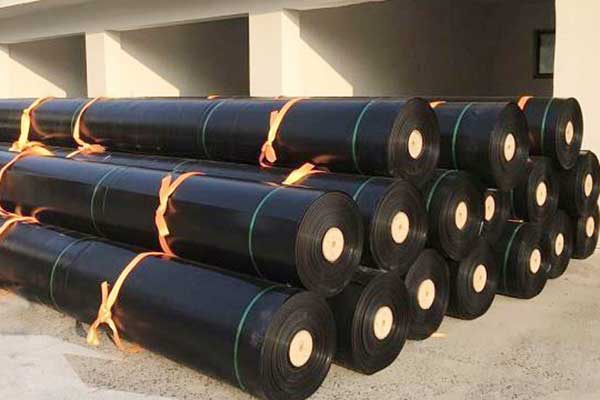Home » How Plastic Resin Revolutionizes Geomembrane Manufacturing
What Is Geomembrane
Geomembranes are geotechnical anti-seepage materials that use plastic film as an anti-seepage substrate and are composited with non-woven fabrics. The anti-seepage performance of new geomembranes mainly depends on the anti-seepage performance of plastic films. Geomembranes are made of various materials, such as EPDM (ethylene propylene diene monomer), linear low-density polyethylene (LLDPE), high-density polyethylene (HDPE), EVA (ethylene-vinyl acetate copolymer), polyvinyl chloride (PVC), and polypropylene (PP). Because of their ability to block fluids, they can help prevent the spread of pollutants and can be used with soil liners or permeable geotextiles to create a composite liner system that provides additional safety. There are also designs for using ECB (ethylene vinyl acetate modified bitumen blended geomembranes) in tunnel applications. They are a polymer chemical flexible material with a small specific gravity, strong elongation, high adaptability to deformation, corrosion resistance, low temperature resistance, and good anti-freezing performance.
Key Benefits of Different Plastic Resins in Geomembrane Manufacturing
HDPE geomembranes
HDPE geomembrane is made of high-density polyethylene, which has good heat resistance and cold resistance, as well as good chemical stability, and can resist strong acids, alkalis, oils, and high corrosion coefficients. In addition, HDPE geomembrane also has excellent resistance to low temperature, aging, corrosion, and cracking, and has a service life of up to 50 years. This type of geomembrane has excellent anti-seepage performance and mechanical strength. It is particularly suitable for projects such as liquid storage tanks and landfills. HDPE geomembrane is suitable for projects that require long-term stability and weather resistance due to its excellent chemical resistance and physical properties.
HDPE liner can withstand a variety of solvents and is the most widely used geomembrane liner in the world. Although HDPE geomembrane is not as flexible as LLDPE, it has a higher specific strength and can withstand higher temperatures. Its excellent chemical resistance and UV resistance make it a very cost-effective product.
LDPE geomembrane
Although LDPE geomembrane is not as good as HDPE geomembrane in some properties, its aging resistance and environmental stress resistance are stronger than high-density polyethylene. This makes LDPE geomembrane suitable for situations where higher anti-seepage performance is required, such as soil waterproofing membranes, underground parking lots, etc.
LLDPE geomembrane
It has a low permeability coefficient, can effectively prevent the penetration of liquids and gases, and is suitable for various anti-seepage projects.
EVA geomembrane
It is composed of ethylene/vinyl acetate copolymer, has good elongation, high adaptability to deformation, corrosion resistance, low temperature resistance, and good antifreeze performance. These characteristics make EVA geomembrane suitable for a variety of environmental conditions, including cold and corrosive environments.
PVC geomembrane
Although it is not the most common geomembrane material, PVC geomembrane also has certain applications. It has excellent chemical stability, can resist erosion by a variety of chemicals, and is suitable for some special application scenarios. Geomembranes processed from different plastic resins have their own advantages, and the choice of which material depends on the specific application requirements and environmental conditions. HDPE geomembrane is suitable for projects that require long-term stability and weather resistance due to its excellent chemical resistance and physical properties.

Why Plastic Resin is Essential for Quality Geomembrane Production
Corrosion Resistance of Resin Materials
Plastic resin, as a polymer compound, has corrosion resistance. It can make the surface of geomembrane smooth and not easily corroded by chemicals, thereby improving the service life and durability of geomembrane. In addition, it can also increase the anti-ultraviolet ability of geomembrane, ensuring that geomembrane can effectively play a protective role for a long time.
Ductility of Resin Materials
Resin materials have high ductility and elasticity. In geomembrane production, it can increase the tensile strength of geomembrane, making it more flexible and not easy to break, thereby improving the tensile strength of geomembrane. In addition, resin materials can also make geomembrane more adaptable to different terrains and environments, improving the application range and applicability of geomembrane.
Anti-penetration ability of resin materials
The main function of geomembrane is to isolate and waterproof, while resin materials can increase the density and compactness of geomembrane, thereby enhancing the anti-penetration ability of geomembrane. In addition, resin materials can also make geomembrane smoother and denser, reduce the gap between geomembrane and base layer, thereby further improving the anti-penetration ability of geomembrane.
Requirements for the MFR of plastic resins used in the production of geomembranes
The raw materials used to produce geomembranes need to meet specific standards to ensure their performance and quality. The melt mass flow rate (MFR) of plastic resins is an important indicator that is directly related to the processing performance and final performance of geomembranes. According to relevant standards, the melt mass flow rate of plastic resins used in geomembranes should be less than 1.0 g/10 min. This is to ensure that the geomembrane has good processability during the production process, and also to ensure that the geomembrane can maintain stable physical and chemical properties during use.
How to choose the most cost-effective plastic resin for geomembrane
If you know exactly the product name and model you need for the production of geomembranes, tell us directly and we will check whether we have stock. Or we can recommend brands and models similar to your needs for you to choose. If you only know a few specific parameters, or want to develop a new geomembrane, you can tell us some information you know, and our professionals will recommend suitable models for you and give you a quote.
